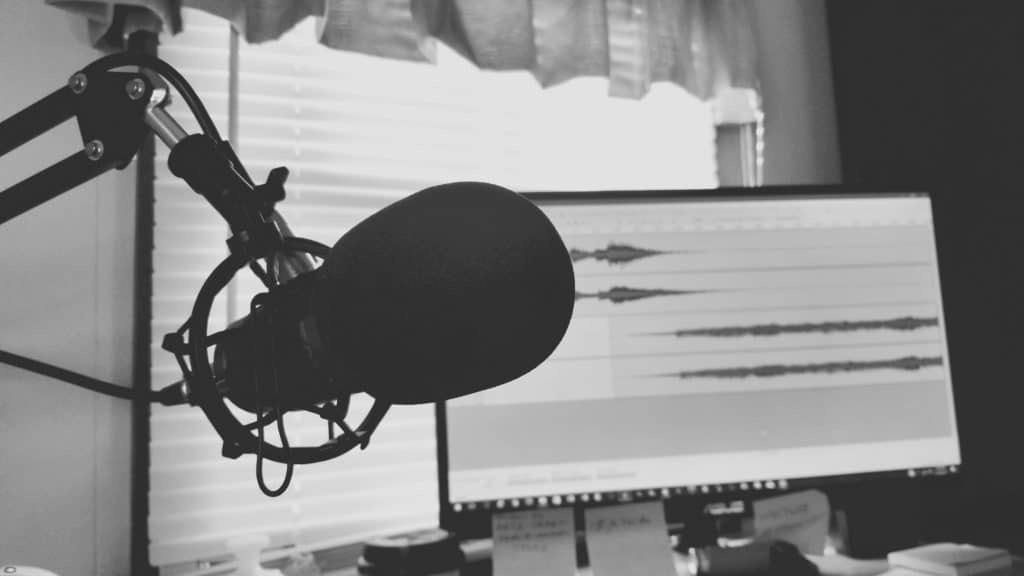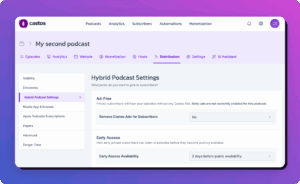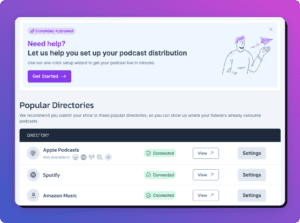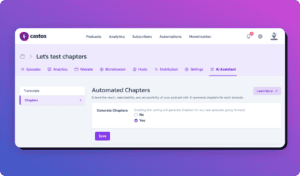As a podcast host, your content isn’t your only concern. Your delivery is just as important, so it’s critical that you understand how to speak slowly.
Why is fast talking a problem? Because it usually leads to confusion.
Podcast listeners are naturally lazy. They don’t want to work hard to understand your episodes. If you talk so fast that they have to exert themselves to understand you, they’ll grow bored and find another podcast to listen to.
Fast talking often upsets your diction by blurring your words and phrases together. When you rush, your tongue breaks through the barriers between words. You drop vowels from one word, consonants from another, and end up with a jumbled mess that your listeners have to decode in real-time.
That’s quite difficult for them when they’re trying to digest the substance of your episode as well. If you rob them of the time they need to understand what you say, they’ll lose their place entirely.
And it’s not like your listeners can tell you when they don’t understand something. They can’t ask you to go back and re-explain something. They’ll just stay lost until they can find their own way.
If this happens too often, they’ll abandon your show and possibly give you a bad review.
How to Speak Slowly
As a podcast host, it’s your job to make each episode comfortable for your audience to listen. If they feel like they have to focus intensely or replay your recording to hear what you just said, there’s a pretty good chance they’ll find a new podcast.
In today’s article, we’d like to offer a collection of tips to help you learn how to speak slowly during your podcast episodes. These may not all apply to you, so use the ones that help you create a comfortable, easy-to-listen-to pace.
1. Get Feedback from Your Community
Before you make any radical changes to your speech pattern, reach out to your community of fans for their feedback. Ask them if they think you speak too quickly, if you speak quickly at certain points, if you mash words together, etc. This is the fastest way to learn how to speak slowly.
You may still want to slow down even if they don’t complain, but they can provide valuable tips to help you optimize your performance. For instance, if someone were to say “You start to talk quickly when you think something should be obvious,” you would know exactly where to take more time.
2. Take More Breaths
Have you ever found yourself out of breath just from talking? That usually happens because you’ve been talking too fast for too long. Failing to breathe between sentences deprives you of air, which makes your voice weak, quiet, and unclear.
Force yourself to take a deliberate breath in between sentences. This will slow down your speech and give you more stamina to talk longer. (Here’s a great resource on breathing properly for speaking.)
3. Mark Your Pauses in Your Script
If you create a podcast script for your episode, mark spots for pauses in your copy. This will remind you to pause regularly as you read.
You should have pauses in several places:
- At the end of each sentence.
- After a major piece of information.
- Right before you draw a conclusion.
- When the topic changes.
- In between sentence clauses (usually around the comma).
- Anywhere else you would naturally pause in conversation.
Furthermore, take an extra long pause between major points. It’s okay to be silent for three or four seconds. Your listener won’t mind. In fact, it will send a strong signal that you’re about to switch gears.
4. Speak Each Word Separately
Like we said earlier, talking quickly blurs words. Phrases like “I often think that…” becomes “Ioffenthinthat…” It creates a jumbled mess that makes your listeners wonder if you suddenly switched to a foreign language.
The simplest way to speak words separately is practice saying words clearly, from beginning to end. Pronounce every syllable. For instance, say “probably” instead of “prolly.” This will force you to speak slower as you concentrate on every word.
You might also find it helpful to practice some tongue-twisters. These exercise your mouth and tongue muscles and improve your pronunciation. They also help you establish a vocal cadence just before you start talking at length.
- “The lips, the teeth, the tip of the tongue.”
- “Rubber baby buggy bumpers.”
- “How now brown cow.”
- “She sells sea shells by the sea shore.”
Here’s a big list of tongue twisters you could run through before recording an episode.
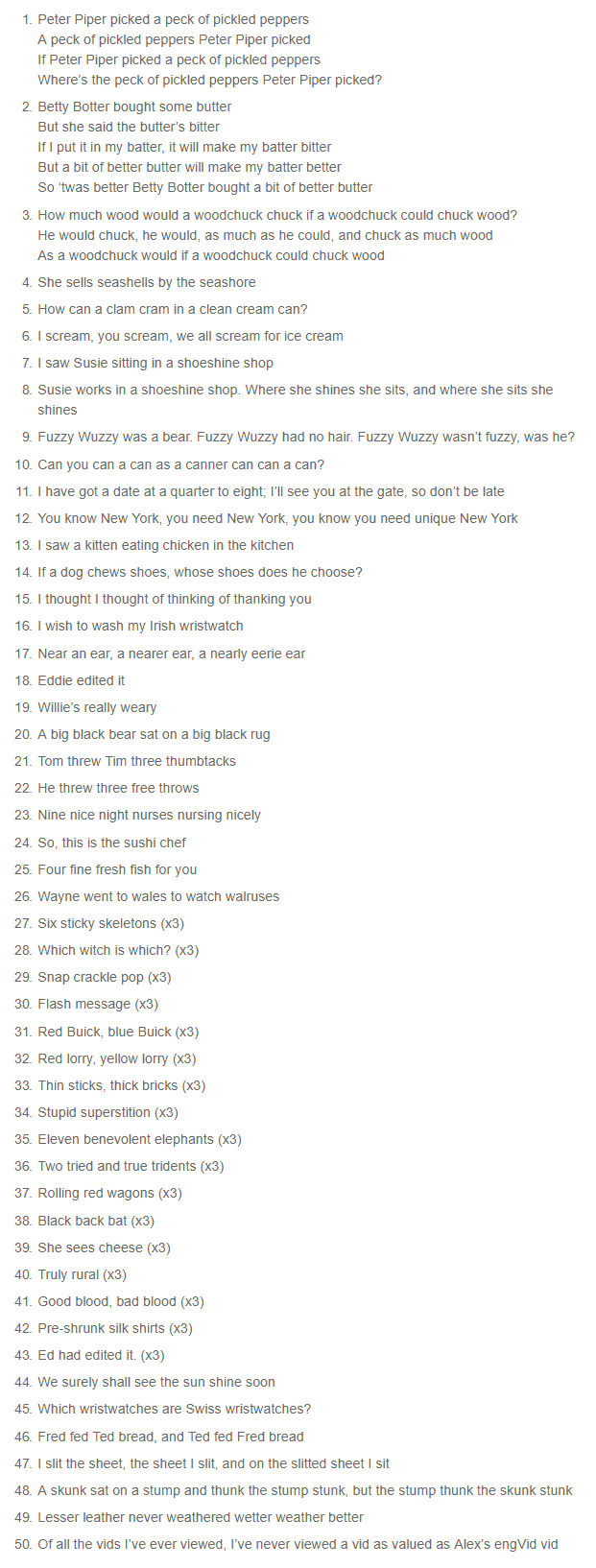
Source: engvid.com
5. Look Your Guest in the Eye
When you don’t have feedback from your listeners, it’s easy to assume they understand your topic as well as you, because they aren’t there to show their confusion.
A great way to slow down is to invite someone to listen to you while you record your episode. If they seem confused or struggling to keep up, remind yourself to slow down. Ask them to give you a signal if it seems like you’re speeding up.
If you conduct interviews via Skype or Zoom, turn on the video feature so you can get their feedback.
6. Pause Instead of Using Filler Words
We use filler words such as “like,” “um,” and “uh,” when we struggle to find the right words. But they have the effects of speeding up your speech and making you seem confused. Instead of filling pauses with useless words, just pause.
7. Practice Self-Calming Techniques
Fast talking is often the result of anxiety or insecurity. It can affect you whether you’re nervous about speaking situations or if you experience general anxiety. Here are some strategies to calm yourself. These are basic, but they work.
- Count your breaths. Practice taking even breaths by inhaling and exhaling in a rhythmic fashion by timing yourself. Inhale for four seconds. Then exhale for four seconds. Take 20 or 30 timed breaths twice a day every day to develop a habit.
- Relax your muscles. Anxiety tends to cramp your muscles. Practice regularly relaxing the muscles throughout your body, especially your neck, jaw, chest, and mouth.
- Pause during your recording. If you feel anxious or flustered during a recording, just pause for a minute. You can edit out the silence later. Keep in mind that you always have the option to repeat a previous section of your script/notes and cut the bad version out.
- Get some brief exercise. Do some light calisthenics before you record your podcast episode. This may help you work out any built-up energy.
Here are some additional breathing exercises that’ll help keep you calm.
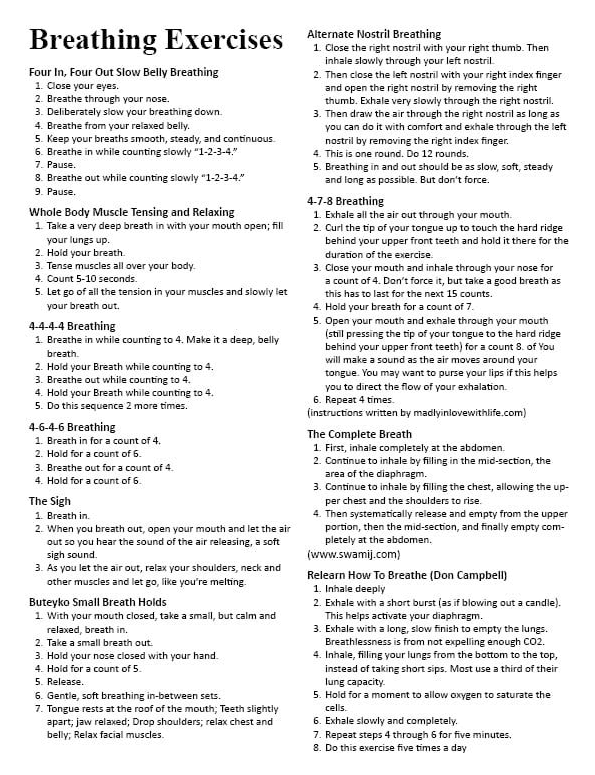
Image: new-synapse.com
8. Use More Transition Words and Phrases
Transition words and phrases are terms that help listeners progress from one idea to another. They give your thoughts order by bridging concepts together and clearing confusion.
Transitions slow down your speech because they come with an innate pause. For example, if you said “Similarly, it’s important to build marketing activities into your daily schedule,” notice how there’s an unavoidable pause after “similarly.”
Here are some common transition words:
- Similarly, in the same way, likewise, at the same time
- Consequently, therefore, accordingly, hence
- For example, in fact, indeed, to illustrate
- On the contrary, however, nevertheless, still, yet
- To this end, for this purpose, for this reason
Here’s a much bigger list of transition words to weave into your script.
9. Practice Before Your Official Recording
A rapid delivery is often born of insecurity. If you aren’t familiar the topic or don’t have much experience delivering spoken content, your low confidence can force you to speed up to get through it.
Practice is the only thing that cures confidence issues, which means you can’t learn how to speak slowly without rehearsing. Try rehearsing your episode once or twice so it’s familiar when you record. Practicing will also help you identify difficult sections that need work.
10. Use Speed Sparingly
Teaching you how to speak slowly wouldn’t be accurate without this caveat: Speed isn’t always a problem. Sometimes good storytelling requires a faster presentation.
Speed is great for describing fast action, skipping through details your audience already knows, and inciting excitement in your listeners. But it only works if you use it sparingly.
Plan your “fast talking segments” as you write your script or plan your show notes. Mark specific places where you want to talk faster. This will ensure you use the technique properly and not too often.
Don’t Change Yourself Too Much
Okay – We’ve taught you how to speak slowly, but there’s one last thing to keep in mind:
Accept your natural style.
There are plenty of podcast hosts, presenters, speakers, lecturers, and entertainers who talk quickly because that’s what comes natural to them.
Trying to change your natural style too much will make your delivery seem forced and artificial. Your listeners won’t trust that you’re being authentic with them. Even if the substance of your podcast is solid, your listeners will fail to connect.
Besides, you don’t have to be like everyone else. It’s fine if you speak quickly, as long as your audience can understand your words. But if you think they’re struggling to follow along, take these tips seriously to learn how to speak slowly.
